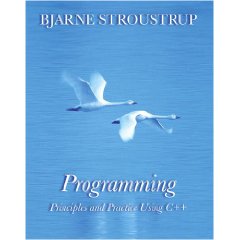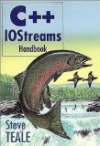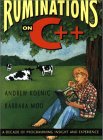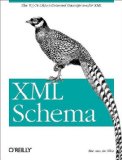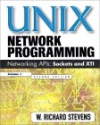Olivier Langlois's blog
Categories: Book reviews, C++, Code Optimization, Compiler, Fractal, Linux/UNIX, Multithreading, Software security, TCP/IP, Web, Windows programming
09/11/09
Programming: Principles and Practice Using C++
This is the latest book from Bjarne Stroustrup, the inventor of the C++ programming language. It has been published very recently and I did not have yet the opportunity to take a look yet so for now I am just spreading the news about its publication.
09/02/08
C++ IOStreams Handbook
This book has been published in 1993 and iostreams has changed a lot since then so this book is a bit outdated. Things that were not there in 1993 include:
- extension less header files
- std namespace
- IO stream classes were not templates
- No locale and facet classes
- classes that are now deprecated strstream
Surprisingly even with all these changes, most of the code in the book would still compile today. This is one sign that C++ designers took a great care to not break existing code unless absolutely necessary. The book is divided into different chapters. Materials that have still value today are:
- The first 3 chapters that explain why a programmer should prefer using io streams over printf
- The next few chapters describing the translator classes (istream,ostream,etc)
- Even if the code is rather cryptic in my opinion, there is a chapter that shows how to write table based extractor and inserter functions (operator<< and operator>>). One application of such function, for instance would be to implement a regular expression processor with a DFA.
There are easier ways to implement regular expressions with the boost library. The value that I see in the third point is that I have always kept my own operators << and >> very simple and I have found this part of the book was eye opening to what was possible to do with these functions.
The chapter that I have found to have failed the test of time is the last and very lengthy chapter that presents close to 50 small test programs so you could test that your iostream implementation was compliant with the latest C++ draft specifications for iostreams. At the publishing time, it was perhaps needed as C++ implementations were trying to catch up with a moving standard but today, iostreams specifications have been stable for many years. I think that it is safe to take for granted that your iostreams behavior is compliant with the standard or it should be a total shame for the library developer if it is not the case.
To conclude, since the book is still accurate on most points, it can still be handy as a reference if it is hanging around. However, at the same time, since iostreams have changed in subtle ways since the publishing date, I would recommend looking for a more recent book for a new purchase. I have not read it but 'Standard C++ IOStreams and Locales' might be a better choice.
08/22/08
Ruminations on C++
I have got interested in this book because I have read from many sources on Mr. Koenig involvement in several key elements of the C++ language such as argument dependant lookup (ADL), also called the Koenig lookup, and the intersect rule for function overloading. In fact, if you read the book 'The design and evolution of C++', Andrew Koenig name is omni present throughout the book. So I was curious to see what Mr. Koenig had to say on C++.
Reading this book has been like a roller coaster ride. First, the cover is intriguing with its recursive pattern where you can see a girl under a tree in a field with cows in the background reading the 'Ruminations on C++' book with the same cover repeating itself over and over. Then the book is divided into six parts and, in my opinion, not all parts are equally good. The first part is taking a more philosophical view on what the C++ language aims to achieve. This part is not too technical and it has somehow a lot of appeal to my eyes. While reading this part, I was thinking that this was very promising for what was to come.
Then at the second part, it is where things are getting spoiled. Part 2 is describing basic C++ techniques. It is not bad but by having read tons of C++ books, to appreciate one of them, I must find some originality that I haven't found in part 2. This part of the book is average.
Finally, I have changed another time my opinion on the book when I have reached part3. Part3 covers templates and more specifically it recreates the whole though process that the STL designers went through to create STL. I see a lot of value to this kind of activities as I believe that understanding why certain things are done in a certain way can help you to better use those things.
In conclusion, I can recommend this book because I feel that mister Koenig goes beyond just the language syntax and try to teach a though process that someone has to go through to solve programming problems. This is a pedagogical approach not found in every programming book.
08/04/08
XML Schema - The W3C's Object-Oriented Descriptions for XML
I had to create a XML schema at my job for the very first time. This is something that I have never done before and I was a total neophyte on XML schemas. A coworker has lent me this book and I would say that after having been through the book in 2 days, it did its job. I have been able to complete my task and I have created a fairly complex XML schema. One quality that I appreciate in technical books is when the book is entertaining and interesting to read. I know that for the non initiated, technical and entertaining might seem incompatible but I have read such books. XML Schema does not have that quality. However, it has the quality to be extremely good to make its readers learn XML schema. If you need to learn XML schemas, you can read this book. It will not be fun but once you are done with it, you should have a pretty decent understanding on the topic.
Another aspect that I have noted is that on very rare circumstances, that book was lacking clarity in my opinion. There are few sections that I was really trying to understand what the author wanted to explain but after many readings of the same section, I did gave up on trying. The section named 'Asymmetry of these two methods' in chapter 7 is one example of what I am describing.
In conclusion, after weighting in the qualities and the problems of this book, I can recommend this book with confidence for anyone that must learn XML schemas.
07/06/08
UNIX Network Programming: Networking APIs: Sockets and XTI; Volume 1, Second edition
This is considered by many as the TCP/IP application programming bible and I am among them. This book is simply the most complete and detailed book on Socket programming. It describes every option under all their small details. This makes the book reading lengthy and tedious but it also makes it an excellent reference. Even experienced socket programmers will most likely learn something from this book. For myself, I got a better understanding of the listen() parameter purpose, a better understanding of socket lingering behavior and I refer the book from time to time to refresh my memory on topics such as how to time out a TCP connection attempt.
After having borrowed the second edition from someone at my work, I have decided to get myself a copy of the book. I have purchased the third edition. As of the time of writing this review the price for a used copy of the second edition is 6$ compared to 60$ for the third edition. Since I had the chance to compare the content of both editions, you might be interested to know that beside 1 bug fix in the sample code that I have noticed, the content of both edition is identical to 90% in my estimation. The changes are very minor. Some unimportant topics from the second edition such as XTI have been replaced by very specialized new topics. This means that, in my opinion, purchasing the older second edition which is still very accurate is a very good purchase.
Olivier Langlois's blog
I want you to find in this blog informations about C++ programming that I had a hard time to find in the first place on the web.
| Sun | Mon | Tue | Wed | Thu | Fri | Sat |
|---|---|---|---|---|---|---|
| << < | > >> | |||||
| 1 | 2 | 3 | 4 | 5 | 6 | |
| 7 | 8 | 9 | 10 | 11 | 12 | 13 |
| 14 | 15 | 16 | 17 | 18 | 19 | 20 |
| 21 | 22 | 23 | 24 | 25 | 26 | 27 |
| 28 | 29 | 30 | ||||
Search

Categories
Olivier Langlois's blog
- AAC (2)
- Book reviews (12)
- C++ (24)
- Code Optimization (4)
- Compiler (3)
- Fractal (2)
- Linux/UNIX (3)
- Multithreading (3)
- Software security (7)
- TCP/IP (8)
- Web (1)
- Windows programming (19)
- C++ (28)
- tutorials (4)
- General (10)
- Hardware reviews (2)
- Linux (12)
- Recommended books (4)
- C++ (20)
- Code Optimization (2)
- Compiler (3)
- Fractal (2)
- Linux/UNIX (1)
- Multithreading (2)
- Rare out of print (3)
- Software security (5)
- TCP/IP (7)
- Windows programming (16)
- Software reviews (0)
- TCP/IP (8)
- Video games (4)
Archives
- January 2016 (1)
- September 2015 (1)
- July 2015 (1)
- June 2015 (1)
- May 2015 (1)
- December 2013 (3)
- September 2013 (1)
- May 2013 (8)
- April 2013 (1)
- December 2010 (1)
- August 2010 (1)
- June 2010 (1)
- More...
Misc
 XML Feeds
XML Feeds
What is RSS?
Who's Online?
- Guest Users: 1
 BOOKS i'm reading
BOOKS i'm reading




